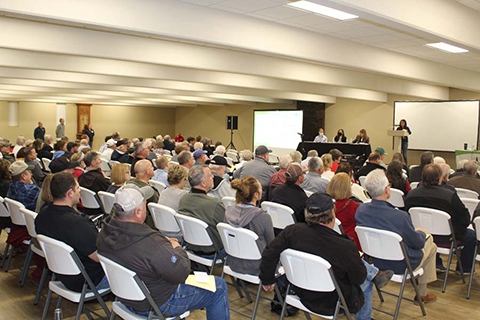BY
The Iowa Utilities Board is holding several public hearings on a proposed carbon pipeline that would run through 36 Iowa counties.
Navigator CO2 Ventures proposes what it calls the Heartland Greenway System pipeline — which would cross Iowa and four other states — transporting carbon to be stored in Illinois.
At a hearing in Rock Rapids Monday, landowner Dan Rentschler, said he believes the project risks outweigh its good. “Most of this property has been in the families for centuries. We are more or less being told what we can take and do, and how they are going to use our land, that’s a part of us,” he says.
Landowners will receive compensation for the land being used and for any crop damage within the first three years of its construction. Landowner Bill Van Gerpen is another landowner who would be impacted by the project. He says he doesn’t trust that his northwest Iowa land will be safe.
“These farmers have farmed this land for years, some of them maybe 60, 80 years. And now to see someone come in, and just tear up that ground, that bothers me,” Van Gerpen said.
There was also a hearing in Le Mars Monday. Plymouth County Board of Supervisors chairman, Don Kass of rural Remsen asked members of the Utilities Board about how the company would use eminent domain to get the land it needs.
“Once you grant that permit they can get as many voluntary landowners signing up as they can. But if they reach a roadblock — say five miles of the pipeline can’t go through because a certain group of landowners say ‘absolutely not.’ Eminent domain is granted at that time or do they have a right to come to you and says this is what we have plans to. How does that work?,” he asked.
IUB chair Geri Huser said the Iowa statute lays out a process where the company can come in and say they can’t work out an arrangement with landowners. She says the process also includes allowing landowners to offer an alternative route.
Navigator vice president Elizabeth Burns-Thompson said they don’t want to have to use eminent domain. “We’re seeking voluntary easements to the best of our ability, right,” she said. “I don’t want to have to use eminent domain. I think that’s part of being good partners.”
Company representatives also said they would collaborate with landowners to ensure fair compensation and safety. It is estimated that the pipeline would capture 15 million metric tons of carbon dioxide each year.
(By Dennis Morrice KLEM, Le Mars/Kendall Crawford, Iowa Public Radio)




